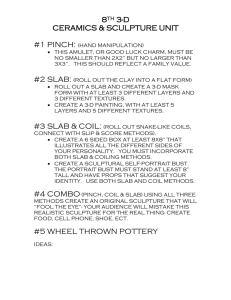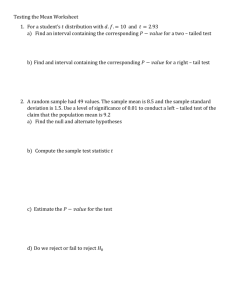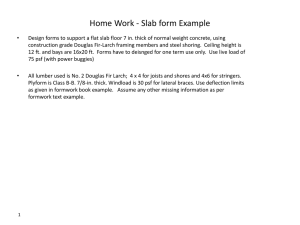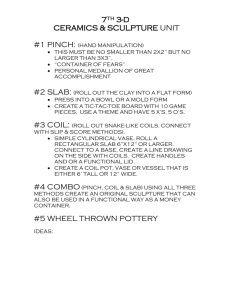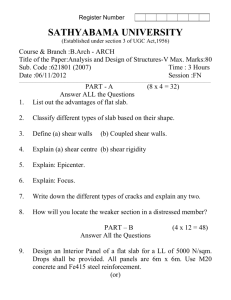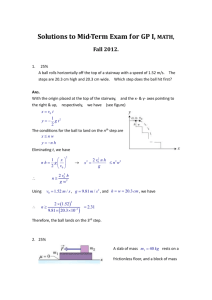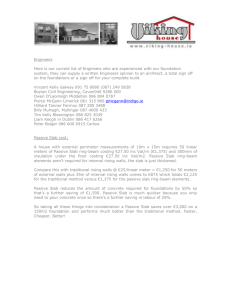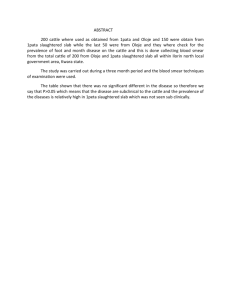Slab Design - WordPress.com
advertisement
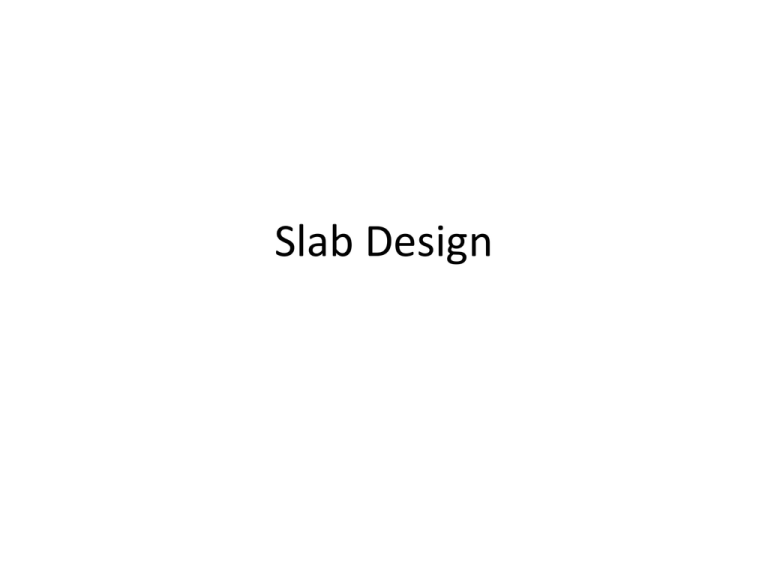
Slab Design What is a Slab? A slab is a flat two dimensional planar structural element having thickness small compared to its other two dimensions. It provides a working flat surface or a covering shelter in buildings. It primarily transfer the load by bending in one or two directions. Types of slabs based on support conditions • One way spanning slab • Two way spanning slab • Flat slab resting directly on columns without beams • Grid slabs or waffle slabs • Circular slabs and other shapes. One way slab Two way slab Flat Slab Grid Slab or Waffle Slab Difference between One way and Two way Slab General Guidelines • Effective span of slab : Effective span of slab shall be lesser of the two 1. l = clear span + d (effective depth ) 2. l = Center to center distance between the support Continued….. • Depth of slab: The depth of slab depends on bending moment and deflection criterion. the trail depth can be obtained using: Effective depth d; l/d = 20 x M.F (Is: 456:2000, P. 38) • For obtaining modification factor, the percentage of steel for slab can be assumed from 0.3 to 0.6% • The effective depth d of two way slabs can also be assumed using cl.24.1,IS 456 provided short span is ≤ 3.5m and loading class is < 3.5KN/m2 Type of support Fe-250 Fe-415 Simply supported l/35 l/28 continuous l/40 l/32 OR The following thumb rules can be used • One way slab d=(l/22) to (l/28). • Two way simply supported slab d=(l/20) to (l/30) • Two way restrained slab d=(l/30) to (l/32) Continued….. • Load on slab: The load on slab comprises of Dead load, floor finish and live load. The loads are calculated per unit area (load/m2). Dead load = D x 25 kN/m2 ( Where D is thickness of slab in m) Floor finish (Assumed as)= 1 to 2 kN/m2 Live load (Assumed as) = 3 to 5 kN/m2 (depending on the occupancy of the building) DETAILING REQUIREMENTS AS PER IS 456 : 2000 • Nominal Cover : For Mild exposure – 20 mm For Moderate exposure – 30 mm • Minimum reinforcement : The reinforcement in either direction in slab shall not be less than • 0.15% of the total cross sectional area for Fe250 steel • 0.12% of the total cross sectional area for Fe415 & Fe-500 steel. Continued….. • Spacing of bars : The maximum spacing of bars shall not exceed • Main Steel – 3d or 300 mm whichever is smaller • Distribution steel –5d or 450 mm whichever is smaller Where, ‘d’ is the effective depth of slab. • Maximum diameter of bar: The maximum diameter of bar in slab, shall not exceed D/8, where D is the total thickness of slab. Design Example 1. Design a simply supported one –way slab over a clear span of 3.5 m. It carries a live load of 4 kN/m2 and floor finish of 1.5 kN/m2 . The width of supporting wall is 230 mm. Adopt M- 20 concrete & Fe-415 steel. 1) Trail depth and effective span Assume approximate depth d =L/26 3500/26 = 134 mm Assume overall depth D=160 mm & clear cover 15mm for mild exposure d = 160-15 (cover) -10/2 (dia of Bar/2) =140 mm • Effective span is lesser of the two i. l =3.5 + 0.23 (width of support) = 3.73 m ii. l= 3.5 + 0.14 (effective depth) =3.64 m effective span = 3.64 m
